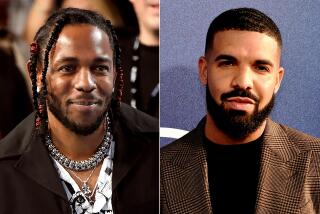Dre Cures Much of What Ails Rap
For all its impact in reshaping pop music, and for all its continuing sales punch, rap finds itself in severe need of a creative reawakening at the end of its second decade. Since the death three years ago of Tupac Shakur, the fieldâs new bestsellers have tended to be more calculated and contrived than inventive and inspired.
That void makes Dr. Dreâs return to action all the more welcome. In 1992âs âThe Chronic,â rapâs greatest producer expanded the musicâs horizons by fusing classic â70s funk-soul strains with contemporary beats. The weakness of the album was the frequent vacuousness of its attitudes and language.
In this follow-up (in stores Tuesday), Dre continues to fuse funk-soul and hip-hop, but heâs not simply retracing his steps. The beats are fresh and the arrangements--on balance--are even more seductive. Though he continues to surround himself with lots of vocal guests--including Snoop Dogg and, in an especially strong turn, Eminem--Dre also shows more authority as a rapper.
The albumâs most dramatic advances, however, are in subject matter. In key tracks, including âStill D.R.Eâ and the dynamic âForget Dre,â Dre--with the help of some co-writers--tells his story in a way that gives the album a convincing, personal side rarely achieved in the generic role-playing that is at the heart of most rap bestsellers.
Some of the tales are boasts about reclaiming Dreâs rap crown, but the most affecting acknowledge the darker consequences of an often turbulent lifestyle. In âThe Message,â the albumâs most powerful moment, he speaks poignantly about the loss of his brother, who was killed in a street encounter.
If much of the album brings a newly thoughtful edge to Dreâs music, however, there is still enough crude and offensive language about women and sex to justify the parental warning sticker on the cover.
You can accept (and even enjoy) some of the hard-core sketches, notably âEd-ucation,â as part of the dark humor tradition of Richard Pryor, one of Dreâs heroes. At other times, however, the âbitchâ and âhoâ talk seems simply pandering, and it detracts from the excellence elsewhere. Even in those moments, however, the production work lulls you as Dre brightens the tracks with distinctive, percolating touches that live up to his reputation as the Quincy Jones and Phil Spector of rap.
*
Albums are rated on a scale of one star (poor), two stars (fair), three stars (good) and four stars (excellent). The albums are already released unless otherwise noted.
More to Read
The biggest entertainment stories
Get our big stories about Hollywood, film, television, music, arts, culture and more right in your inbox as soon as they publish.
You may occasionally receive promotional content from the Los Angeles Times.










